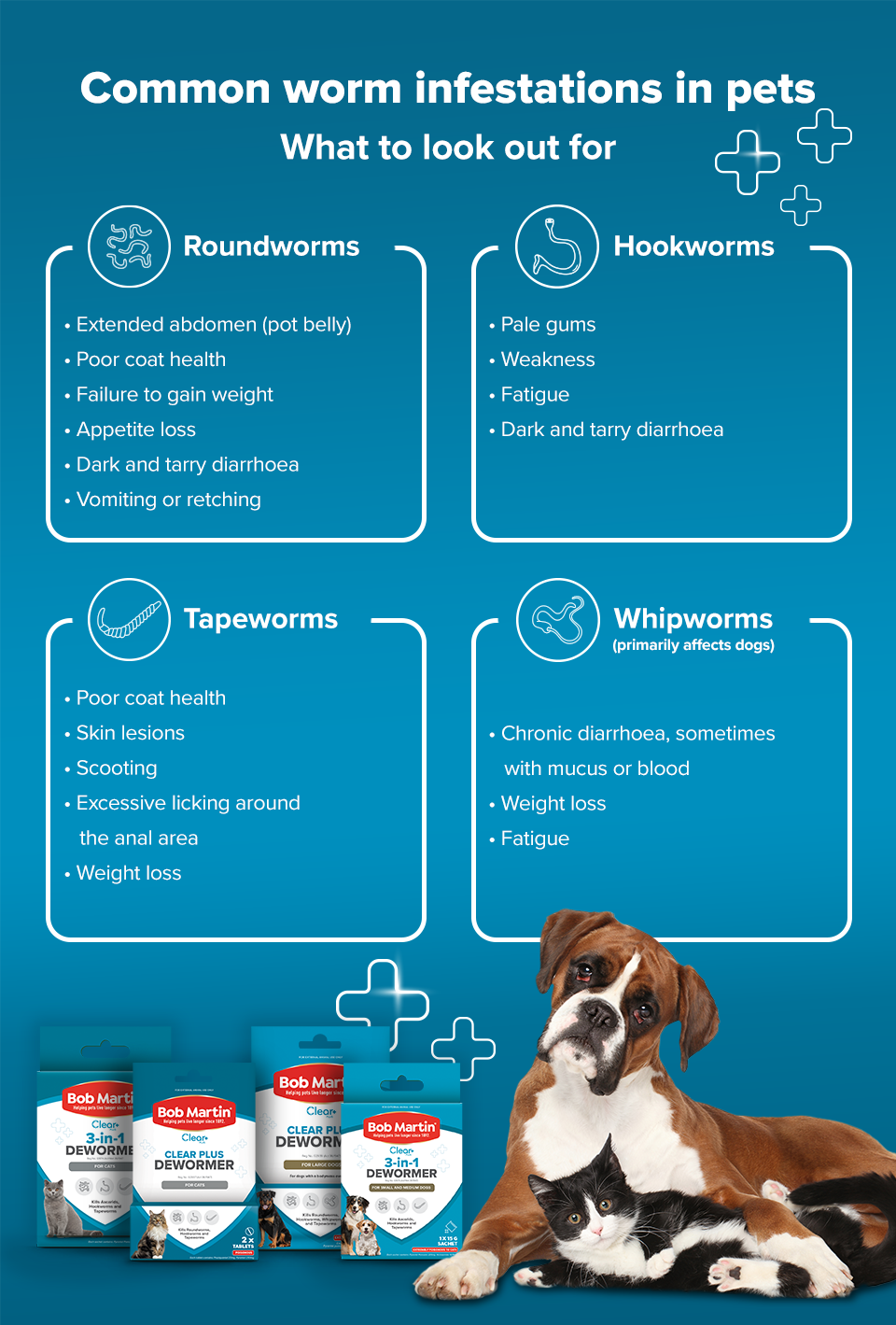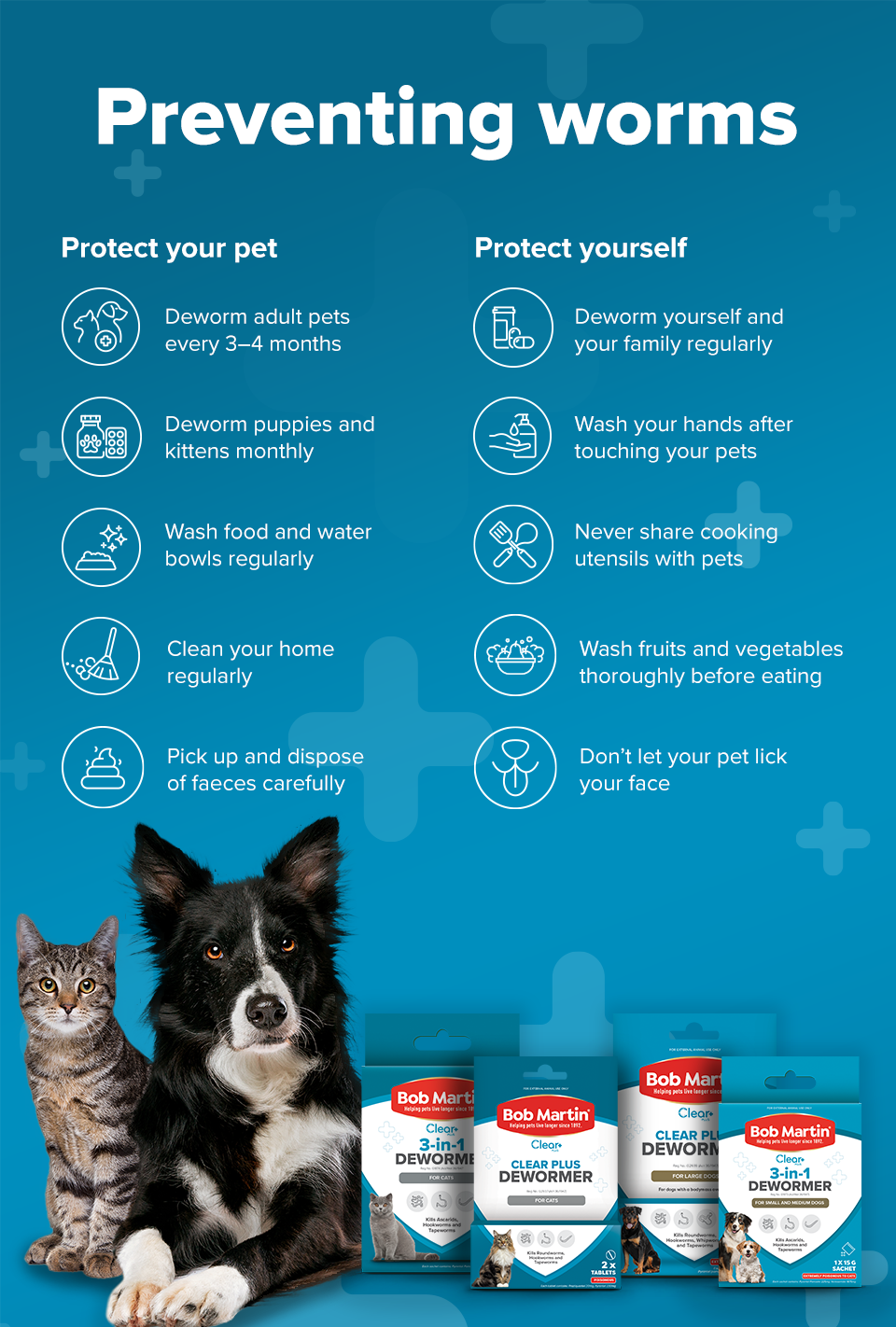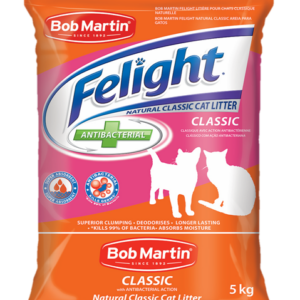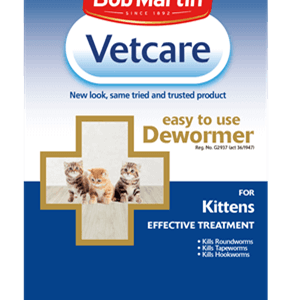What you need to know about deworming your pets
Worms can infect cats and dogs of all ages, and they pose a risk to humans too. That’s why regular deworming should be part of your pet’s routine to take care of their overall health, as well as your own. Luckily, deworming your pets is an easy process that can be done at home with Bob Martin’s range of products.
Worm infestations aren’t always easy to pick up, and your pet often won’t show any visible symptoms of an infection. This is why the South African Veterinary Association (SAVA) recommends deworming adult pets every 3 to 4 months just to be safe. Remember – prevention is always better than cure, but it’s worth knowing some of the common signs so you can start a treatment plan as soon as possible if your pet becomes infected.

Common worm infestations and what to look out for
There are many types of worms that can infect both pets and humans. These are the most common worm infestations found in pets and their symptoms:
- Roundworms are extremely common, particularly in puppies and kittens, and most pets will experience an infestation at least once in their lives. These worms live in the animal’s intestines and can be spread through various methods, making them highly contagious to both pets and humans.
Symptoms to look out for in your pet include an extended abdomen (pot belly), poor coat health, coughing, failure to gain weight, appetite loss, dark and tarry diarrhoea, and vomiting or retching. The worms are especially large in puppies, and, in severe cases, it may be possible to see worms coming out of the puppy.
- Hookworms are slightly more dangerous than roundworms and can also infect humans. These blood-sucking parasites are miniscule and very difficult to spot with the naked eye. Infestations can lead to blood loss and anaemia, and severe infestations are associated with life-threatening complications, especially in young or weak animals.
Symptoms to look out for in your pet include pale gums, coughing, weakness, fatigue, and dark and tarry diarrhoea.
- Tapeworms are relatively harmless, and are usually a result of your pet swallowing an infected flea. This type of infestation often causes discomfort and, occasionally, weight loss and can be transmitted to humans.
Symptoms to look out for include poor coat health, skin lesions, scooting, excessive licking around the anal area, and, occasionally, weight loss.
- Whipworms are intestinal parasites that usually live in the large intestine. They mostly affect dogs and can result in a variety of gastrointestinal issues. While whipworms can be transmitted to humans, the symptoms are rarely severe.
Symptoms to look out for include chronic diarrhoea (sometimes with mucus or blood), weight loss, and fatigue.

Where do pets pick up worms and can this be prevented without medication?
Your pets can pick up worms from many places. They could lick the ground or drink contaminated water, they could ingest infected fleas, they could pick up worms by scavenging or hunting, or by eating contaminated food. Worms can also be passed through the placenta before a mother gives birth or through her milk when feeding.
Unfortunately, worms in pets are somewhat inevitable, even if you are cautious. While you can try to avoid high-risk situations, pets can contract worms from almost anything. Even indoor pets are susceptible to infestations as eggs can be brought in on your shoes and by other creatures like lizards, birds, rodents, and insects.
Regularly deworming your pets keeps infestations at bay, giving you peace of mind knowing that your fur baby is happy, healthy, and worm free.
What products to use and when
When deworming your pets, it’s critical that you use the correct product at the correct time. This depends on your pet’s age and size, as well as the time of the year.
Adult pets should be dewormed every 3 to 4 months with a broad-spectrum dewormer, especially if you take your pet out for walks or to parks and open spaces as worm eggs are often picked up in these spaces.
Puppies and kittens should be dewormed monthly, starting at 4 to 8 weeks old until they are 6 months old. Generally, young animals are only treated with products for roundworms and hookworms as these are safer for them. This is also because they are usually too young for a tapeworm or whipworm infestation to have spread.
It can be confusing to figure out what kind of product your pet needs. Topical dewormers don’t treat tapeworms, so, if you’re looking for a broad-spectrum product that treats all the types of worms mentioned in this article, an oral formulation is a better option.
Bob Martin has a range of deworming tablets for cats and dogs of all ages and sizes. Tablets are convenient and can easily be administered or disguised within a treat. While oral formulations are recommended, every pet is different and it’s important to discuss deworming methods with your vet as they can assess your pet’s specific needs, consider their medical history, and provide tailored recommendations. The Bob Martin Clear+ range of deworming products has got something for every pet.







